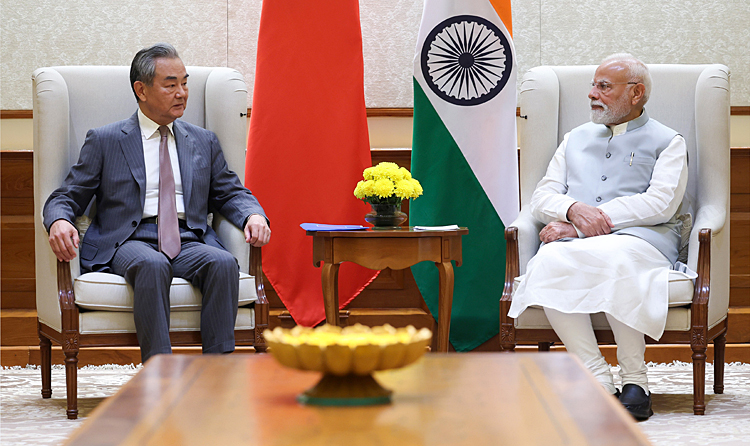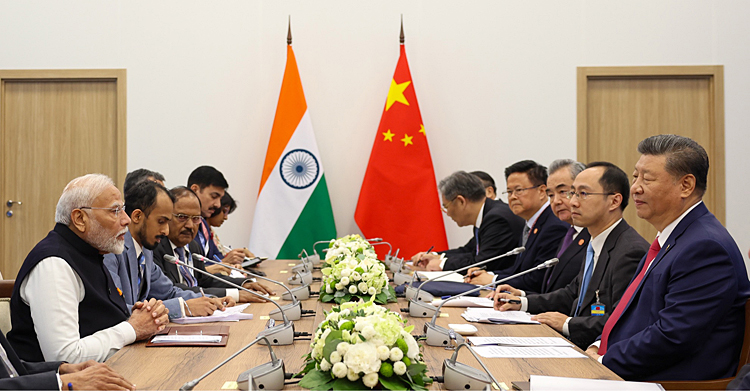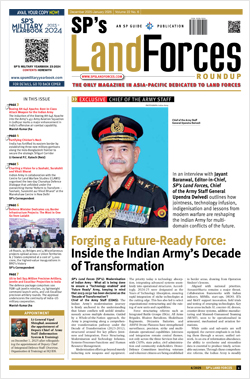INDIAN ARMED FORCES CHIEFS ON OUR RELENTLESS AND FOCUSED PUBLISHING EFFORTS

The insightful articles, inspiring narrations and analytical perspectives presented by the Editorial Team, establish an alluring connect with the reader. My compliments and best wishes to SP Guide Publications.

"Over the past 60 years, the growth of SP Guide Publications has mirrored the rising stature of Indian Navy. Its well-researched and informative magazines on Defence and Aerospace sector have served to shape an educated opinion of our military personnel, policy makers and the public alike. I wish SP's Publication team continued success, fair winds and following seas in all future endeavour!"

Since, its inception in 1964, SP Guide Publications has consistently demonstrated commitment to high-quality journalism in the aerospace and defence sectors, earning a well-deserved reputation as Asia's largest media house in this domain. I wish SP Guide Publications continued success in its pursuit of excellence.
- Appointments Committee of Cabinet approves one-month extension in service of Chief of the Army Staff
- Prime Minister witnesses 'Bharat Shakti' – a Tri-Services Firing and Manoeuvre Exercise in Pokhran, Rajasthan
- Interim Defence Budget 2024-25 — An Analysis
- Union Defence budget 2024
- Indian Army: In quest of greater firepower and policy recommendations for gaps
- Indian Army Annual Press Conference 2024
- Tata Boeing Aerospace Delivers 250 AH-64 Apache Fuselages, Manufactured in India
The India-China Bond
China's Foreign Minister Wang Yi's visit to India in August 2025, the first since the Galwan clashes of 2020, signalled a tentative recalibration in bilateral ties. While unresolved border tensions continue to cast a shadow, the dialogue reflected a pragmatic push by both sides to balance disputes with economic and multilateral cooperation.
 |
The Author is Former Director General of Information Systems and A Special Forces Veteran, Indian Army |

China's Foreign Minister and Special Representative (SR) on the India-China boundary question Wang Yi visited India on August 18-19, 2025 at the invitation of NSA and SR on the boundary question Ajit Doval, with both SRs co-chairing the 24th round of the SR's dialogue on the Boundary Question. Wang also had bilateral talks with External Affairs Minister (EAM) S. Jaishankar and called on Prime Minister Narendra Modi. This was the first visit of Wang to India after China's 2020 incursions in Eastern Ladakh, including the Galwan Clash.
Both sides reviewed the progress made in the implementation of the consensus reached between Prime Minister Modi and President Xi Jinping at Kazan (Russia) on October 24, 2024.
Both sides reviewed the progress made in the implementation of the consensus reached between Prime Minister Modi and President Xi Jinping at Kazan (Russia) on October 24, 2024. They reiterated the importance of maintaining peace and tranquillity in the border areas to promote overall development of the India-China bilateral relationship. According to a statement issued by the Ministry of External Affairs (MEA), "Under the strategic guidance of the leaders of the two countries and in a positive and constructive spirit, the two sides had a candid and in-depth exchange of views on India-China boundary question, and the two SRs agreed on the following:

- The need to take a political perspective of the overall bilateral relationship while seeking a fair, reasonable and mutually acceptable framework for settlement of the boundary question in accordance with the Agreement on Political Parameters and Guiding Principles for Settlement of the India-China Boundary Question signed in 2005.
- Setting up an Expert Group, under the Working Mechanism for Consultation and Coordination on India-China Border Affairs (WMCC), to explore Early Harvest in boundary delimitation in the India-China border areas;
- Setting up a Working Group, under the WMCC, to advance effective border management in order to maintain peace and tranquillity in India-China border areas.
- Creation of General Level Mechanisms in Eastern, and Middle Sectors, in addition to the existing General Level Mechanism in Western Sector, and holding an early meeting of the General Level Mechanism in the Western Sector.
- Use the border management mechanisms at diplomatic and military levels to carry forward the process of border management, and discuss de-escalation, beginning with the principles and modalities thereof."

Both sides also agreed to hold the next round of the SR Talks in China at a mutually convenient time. In Wang's meeting with Jaishankar, there was a similar consensus for developing a cooperative and forward-looking bilateral relationship for mutual gains. Wang welcomed Prime Minister Modi attending the SCO Summit in China (August 31-September 1). China will support India hosting the 2026 BRICS Summit and India will support China hosting the 2027 BRICS Summit.
US President Donald Trump's tariffs terrorism and diatribe against BRICS has contributed to the thaw in India-China relations in a major way; leading to an economically convenient bilateral relationship.
Both sides agreed to: hold the 3rd meeting of the India-China mechanism on people-to-people exchanges in India in 2026; resume direct flights and ease visas; expand the scale of Kailash-Mansarovar Yatra starting 2026; exchange views on trans-border rivers cooperation – China to share hydrological information in emergency situations; re-open trade through Lipulekh Pass, Shipki La Pass and Nathu La Pass; facilitate bilateral trade and investment; maintain rules-based multilateral trading system with WTO and promote a multipolar world.

After Wang Yi called on Prime Minister Modi, the Indian Prime Minister posted on X, "Glad to meet Foreign Minister Wang Yi. Since my meeting with President Xi in Kazan last year, India-China relations have made steady progress guided by respect for each other's interests and sensitivities. I look forward to our next meeting in Tianjin on the sidelines of the SCO Summit. Stable, predictable, constructive ties between India and China will contribute significantly to regional as well as global peace and prosperity."
As for the border settlement, this vexed issue is unlikely to make much headway with major Chinese claims on Indian Territory.
The Kailash-Mansarovar Yatra was resumed this year and direct flights between India and China are likely to resume next month – September 2025. India has relaxed visas for Chinese nationals and no less than 200 FDI proposals from Chinese companies in India are being processed, with instructions to decrease the processing time. China has indicated relaxing controls of exports of Rare Earth Elements (REE) and fertilizers to India. China is also to release the tunnel boring machine held up in a Chinese port, required for Prime Minister Modi's favourite project of the Ahmedabad-Mumbai bullet train; which has been held up since 2022 for want of this machine.

US President Donald Trump's tariffs terrorism and diatribe against BRICS has contributed to the thaw in India-China relations in a major way; leading to an economically convenient bilateral relationship. India-China bilateral trade in FY 2024-25 was $127.7 billion, with the trade balance in China's favour reaching a record high of $99.2 billion. The bilateral trade continues in US Dollars and it remains to be seen whether the common BRICS currency being released in 2026 will be adopted by India-China or will a via media be found for part INR/part Yen trade. As for the border settlement, this vexed issue is unlikely to make much headway with major Chinese claims on Indian Territory. It remains to be seen whether any minor adjustments will come about in future, if at all.
The future of India-China bonds would become clearer in the SCO Summit in Tianjin (China), with a bilateral Modi-Xi discussion.
Same goes for the de-induction which is unlikely in Eastern Ladakh since the PLA has consolidated their new positions occupied in 2020, ramped up surveillance, communications, augmented weapon platforms and logistics support. Besides, China's new bridge on Pangong Tso enables quick induction of mechanised forces and China's second expressway through Aksai Chin (G-695 highway) would touch Galwan, Hot Springs and Pangong Tso by 2035. Beijing would be eyeing ore territory of Ladakh to provide depth to the G-695 Highway – similar to China invading Aksai Chin to give depth to its Western Highway – the road China began constructing through Aksai Chin in the 1950s to link the Chinese regions of Tibet and Xinjiang.
The future of India-China bonds would become clearer in the SCO Summit in Tianjin (China), with a bilateral Modi-Xi discussion. We may soon witness resumption of India-China joint anti-terrorism exercises. But finally, the sincerity of China will play a major role in future India-China relations.





